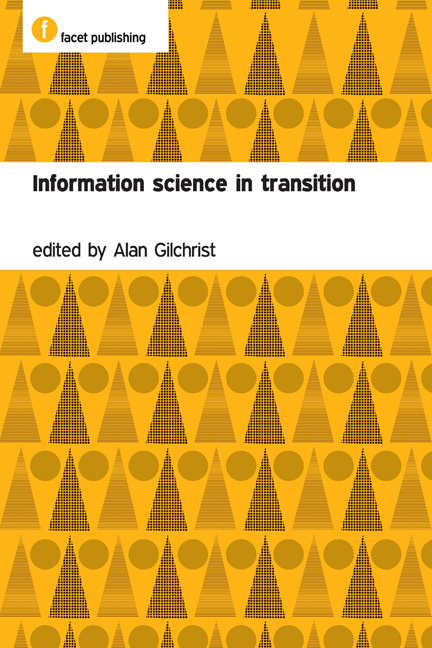Book contents
- Frontmatter
- Contents
- Contributors
- Preface
- Editorial
- Guest Editorial: Meeting the challenge
- 1 Fifty years of UK research in information science
- 2 Smoother pebbles and the shoulders of giants: the developing foundations of information science
- 3 The last 50 years of knowledge organization: a journey through my personal archives
- 4 On the history of evaluation in IR
- 5 The information user: past, present and future
- 6 The sociological turn in information science
- 7 From chemical documentation to chemoinformatics: 50 years of chemical information science
- 8 Health informatics: current issues and challenges
- 9 Social informatics and sociotechnical research – a view from the UK
- 10 The evolution of visual information retrieval
- 11 Information policies: yesterday, today, tomorrow
- 12 The disparity in professional qualifications and progress in information handling: a European perspective
- 13 Electronic scholarly publishing and Open Access
- 14 Social software: fun and games, or business tools?
- 15 Bibliometrics to webometrics
- 16 How I learned to love the Brits
- Index
Guest Editorial: Meeting the challenge
Published online by Cambridge University Press: 08 June 2018
- Frontmatter
- Contents
- Contributors
- Preface
- Editorial
- Guest Editorial: Meeting the challenge
- 1 Fifty years of UK research in information science
- 2 Smoother pebbles and the shoulders of giants: the developing foundations of information science
- 3 The last 50 years of knowledge organization: a journey through my personal archives
- 4 On the history of evaluation in IR
- 5 The information user: past, present and future
- 6 The sociological turn in information science
- 7 From chemical documentation to chemoinformatics: 50 years of chemical information science
- 8 Health informatics: current issues and challenges
- 9 Social informatics and sociotechnical research – a view from the UK
- 10 The evolution of visual information retrieval
- 11 Information policies: yesterday, today, tomorrow
- 12 The disparity in professional qualifications and progress in information handling: a European perspective
- 13 Electronic scholarly publishing and Open Access
- 14 Social software: fun and games, or business tools?
- 15 Bibliometrics to webometrics
- 16 How I learned to love the Brits
- Index
Summary
Introduction
It is a great privilege to be asked to contribute some comments to this special issue of JIS.
I have enjoyed reading these papers, and seeing how much our field has moved on since the Journal of Documentation attempted a similar historical survey in 1994 [1], just as the internet was ‘taking off ‘.
My first thoughts were of Jason Farradane, who played such a big part in founding the Institute of Information Scientists in 1958. The IIS has now disappeared within CILIP, and Jason would have been very dismayed at this development.
I first encountered him at the Royal Society Scientific Information Conference of 1948, where he spoke on ‘the scientific approach to documentation’. In 1952 he was one of the founder members of the Classification Research Group, where he was often defending a minority position, connected to his own ideas of relations between topics, to which Stella Dextre Clarke refers in her paper. He was a serious man, but the more I talked with him, and disagreed with him over many things, the more I liked him.
In 1955, we were invited together to a meeting of the Aslib Aeronautical Group, at which Cyril Cleverdon spoke about his plans for retrieval evaluation (Cranfield1), which Stephen Robertson discusses in his paper. We spoke about faceted classification, and Cyril challenged us to prepare a scheme for aeronautics, that he could use in his test. With inordinate bravado, we accepted the challenge, and – after much advice from Cyril and his team – managed to produce one. In retrospect – given that it was compiled by two chemists – we were amazed that it performed at all.
What else was happening around about 1958? There were printed publications of every kind. There were libraries – public, national, government, academic, institutional, industrial – and they were classified and had catalogues. We were much concerned with interlibrary loan, and Donald Urquhart had recently been told to drop all other work and start to plan a new national science lending library for the UK. There were printed indexing and abstracting periodicals, and bibliographies. An industrial firm might have, as well as a technical library, a centre for internal reports, a section dealing with patents, an ‘intelligence’ unit for commercial information, and a correspondence registry. Some of us were playing around with punched or edge-notched cards for ‘mechanized retrieval’.
- Type
- Chapter
- Information
- Information Science in Transition , pp. xxi - xxxPublisher: FacetPrint publication year: 2009



